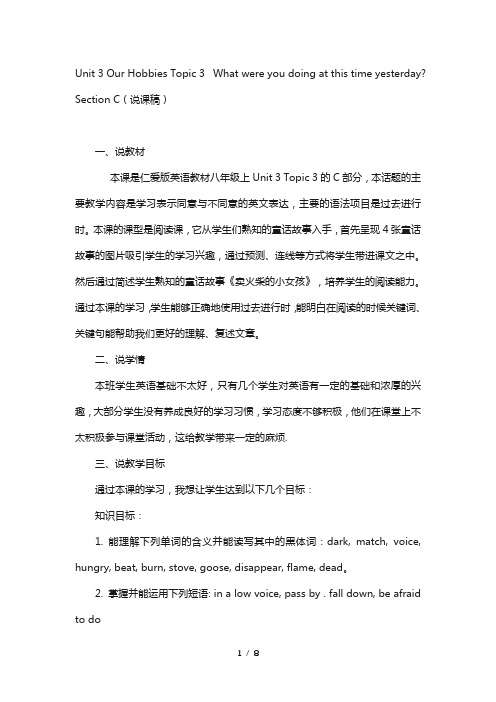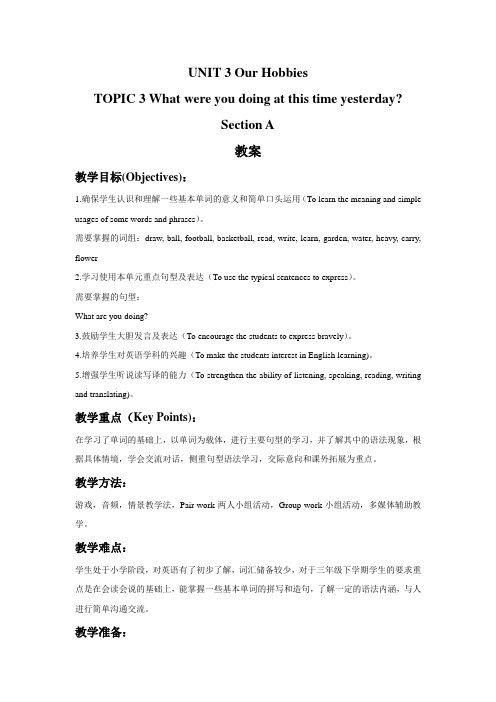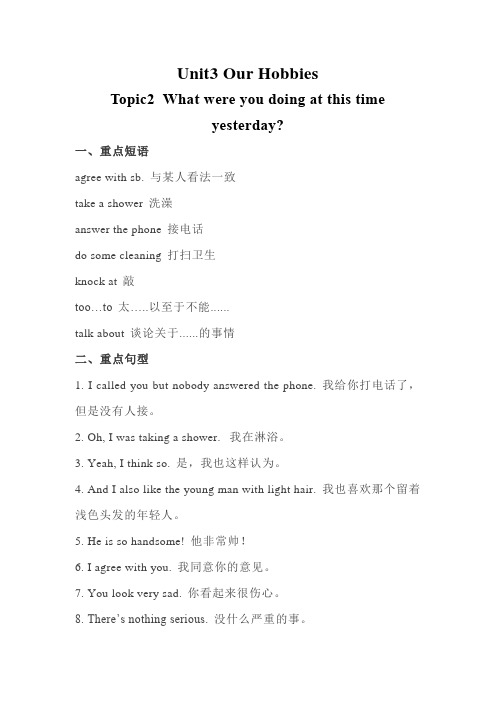仁爱版英语八年级上册 Unit 3 Topic 3 复习课件
仁爱版八年级英语上册Unit 3 Topic 1复习课件(共16张PPT)

—My classmates. 5. Henry likes listening to Beijing Opera __i_n_h_i_s_f_re_e__ti_m_e___
Her wet clothes are ___s_t_ic_k_i_n_g_t_o_____ her body. 3. 男孩正从一张报纸上剪下一张图片。
The boy is ___c_u_t_ti_n_g_o_u_t_____ a picture from a newspaper. 4. 王老师昨天做了演讲,他以一个故事开头。
3. Our Chinese teacher asked us to recite these three _p_o__e_m_s_(poem) this week.
4. —What’s your __h_o_b_b_y__/'hɑ:bi/? —I like drawing pictures.
5. Mary has many _p_e_t_s_____(pet). She keeps two cats, three dogs and many fish at home.
—I don’t know. Maybe it’s Lucy’s. 3. Liu Mei was too afraid to say a word when she saw a(n)
___s_n_a_k_e__ in the grass. 4. Your T-shirt is ____d_ir_t_y__. Take it off and wash it right now. 5. My grandfather keeps a lot of sheep and ____p_ig_s__ on his
Unit3 Topic3 Section D-八年级英语上册课件(仁爱版)

adj. 神圣的 在那天
When : before 1800
a holy day
Where: at church Who : many people
What : rest and pray
A. felt too tired to work
B. were closed all day 太......而不能......
Section D
1. How many days are there in a week? 2. How many days are there in a weekend? 3. Do you know anything about
the weekend?
上帝the first day 创造了天地, the second day 创造了水和空气, the third day 创造了植物, the fourth day 创造了日月, the fifth day 创造了鱼、鸟等生物, the sixth day 牲畜、昆虫、野兽以及管理这一切的人。 the seventh day 休息时,人类为了感谢上帝,纷纷向他朝拜。
the beginning of the weekend
c 1. Before 1800, people e 2. In the early 1800s, many workers d 3. In 1874, English workers b 4. By 1930, most American workers a 5. After 1940, American workers
仁爱版八年级英语上Unit-3-Our-Hobbies-Topic-3--(说课稿)

Unit 3 Our Hobbies Topic 3 What were you doing at this time yesterday? Section C(说课稿)一、说教材本课是仁爱版英语教材八年级上Unit 3 Topic 3的C部分,本话题的主要教学内容是学习表示同意与不同意的英文表达,主要的语法项目是过去进行时。
本课的课型是阅读课,它从学生们熟知的童话故事入手,首先呈现4张童话故事的图片吸引学生的学习兴趣,通过预测、连线等方式将学生带进课文之中。
然后通过简述学生熟知的童话故事《卖火柴的小女孩》,培养学生的阅读能力。
通过本课的学习,学生能够正确地使用过去进行时,能明白在阅读的时候关键词、关键句能帮助我们更好的理解、复述文章。
二、说学情本班学生英语基础不太好,只有几个学生对英语有一定的基础和浓厚的兴趣,大部分学生没有养成良好的学习习惯,学习态度不够积极,他们在课堂上不太积极参与课堂活动,这给教学带来一定的麻烦.三、说教学目标通过本课的学习,我想让学生达到以下几个目标:知识目标:1. 能理解下列单词的含义并能读写其中的黑体词:dark, match, voice, hungry, beat, burn, stove, goose, disappear, flame, dead。
2. 掌握并能运用下列短语: in a low voice, pass by . fall down, be afraid to dowarm sb. up, a fourth match, hold sb. in one’s arms3. 能够正确使用过去进行时。
4. 能用过去进行时讲述发生在过去的事情并能给出自己的看法。
技能目标:1. 能听懂本课的故事材料、过去进行时的表达以及跟课文水平相当的故事。
2. 能将文章中的故事讲给他人听且能简单地评价故事。
3. 能读懂生词很少的童话故事,以及相应的文章。
4. 能正确模仿本课课文,编写一个简单的小故事。
重庆市仁爱版初中英语八年级上册Unit3 Topic3教案

【教学标题】八年级上册Unit3 Topic3【教学目标】1、通过练习进一步掌握感叹句结构,能运用解题技巧解感叹句相关题型2、复习并进一步掌握过去进行时态,熟悉并掌握该时态的时间状语3、能正确区分引导时间状语的连词when与while的区别,及until的用法【教学重点】1、when& while的区别:延续性动词(表示一段时间)【从句用进行时】when +短暂性动词(表示一个时间点)【从句用一般过去时或一般现在时】while + 延续性动词【从句用进行时】2、过去进行时的基本结构:was / were + v.-ing + 其他时间状语:at that time, at nine o’clock yesterday, from seven to nine last night, all day yesterday, at this time yesterday, at 8:15 this morning, the whole morning yesterday等。
【教学难点】please变形的不同词性及用法区别与常考结构:be pleased to do sth; be pleased with sb./sth. 【教学内容】※考点 1 when & while、until原文重现:The telephone rings while Jane is practicing the violin.On the plane from New York, Jim was playing computer games until they served the food.1.1 此处while = when 意为“当……的时候”,引导时间状语从句。
when 与while 区别延续性动词(表示一段时间)【从句用进行时】when +短暂性动词(表示一个时间点)【从句用一般过去时或一般现在时】延续性动词【从句用进行时】Eg. While / When I was having supper, someone knocked at the door.When you leave the room, please turn off the lights.1.2until “直至;直到”(主句用延续性动词)not ... until ... “到……时候才”(主句用短暂性动词)【过手练习】1. Tom was watching TV _______ his father came back.A. whileB. asC. whenD. and2. Now many young people _______ go to bed _______ ten o'clock every night.A. don't; untilB. not; untilC. didn't; untilD. /; until3. Newton was playing under an apple tree _______ an apple fell onto his head.A. whenB. whileC. afterD. before※考点 2 pleasant/agree原文重现:I think classical music is pleasant.I don’t agree. I agree with you.2.1pleasant 形容词“令人愉快的,舒适的”辨别:please 动词,“请;使高兴”pleasant 形容词,作定语时,意为“令人愉快的”,一般用来修饰事物;作表语时,句子的主语一般是事物。
仁爱版英语八年级上册UNIT 3 TOPIC 3 Section A 教案

UNIT 3 Our HobbiesTOPIC 3 What were you doing at this time yesterday?Section A教案教学目标(Objectives):1.确保学生认识和理解一些基本单词的意义和简单口头运用(To learn the meaning and simple usages of some words and phrases)。
需要掌握的词组:draw, ball, football, basketball, read, write, learn, garden, water, heavy, carry, flower2.学习使用本单元重点句型及表达(To use the typical sentences to express)。
需要掌握的句型:What are you doing?3.鼓励学生大胆发言及表达(To encourage the students to express bravely)。
4.培养学生对英语学科的兴趣(To make the students interest in English learning)。
5.增强学生听说读写译的能力(To strengthen the ability of listening, speaking, reading, writing and translating)。
教学重点(Key Points):在学习了单词的基础上,以单词为载体,进行主要句型的学习,并了解其中的语法现象,根据具体情境,学会交流对话,侧重句型语法学习,交际意向和课外拓展为重点。
教学方法:游戏,音频,情景教学法,Pair-work两人小组活动,Group-work小组活动,多媒体辅助教学。
教学难点:学生处于小学阶段,对英语有了初步了解,词汇储备较少,对于三年级下学期学生的要求重点是在会读会说的基础上,能掌握一些基本单词的拼写和造句,了解一定的语法内涵,与人进行简单沟通交流。
仁爱版八年级英语上册 Unit 3 Topic 3 Section A 课件(共17张PPT)

at the moment…)
(The Present Continuous Tense)
Jane: This time yesterday? Oh, I was taking a shower.
(The telephone rings while Jane is practicing the violin.)
Jane’s mother: Hello!
Maria:
Hello! _T_h_i_s_ is Maria speaking.
B: I was … What about you? A: I was …
Listen and choose:
(1)What is Jane doing now? (C) A. She is playing the piano. B. She is taking a shower. C. She is practicing the violin.
What were you doing at this time yesterday?
What is she doing now? What was she doing at this time yesterday?
She is reading an English book now.
She was listening to the news at this time yesterday.
Name
Activity
仁爱版初中英语八年级上册Unit·topic 3Section B(共26张PPT)

2 A Listen to the passage and number the pictures.
3
4
2
1
2 B Listen again and fill in the blanks
1. Kangkang is trying his best to _c_a_t_c_h_ __u_p__ _w__it_h_ them.
1.Recite 1a 2.Collect information
about Olympic Games.
2. _A__l_l__ t_h__e__ _fo__u_r__ b__o_y_s__ are neck and neck.
3. Two boys ___r_u_n__ _i_n_t_o____ each other. 4. Michael is running ____p_a_s_t_ them and
/ gr /-- / fr / -- / dr / -- / tr /:
The first consonant is
green fruit dress tree quicker and lighter
than the next one.
/ fl /-- / pl / -- /kl/ -- / bl / -- / gl /:
The weak form of the underlined letters is pronounced as / ə /.
The new words:
shall, message, theater, catch up with, neck and neck
The useful sentences:
Can you tell me anything else?
仁爱英语八年级上册Unit3-topic3知识点总结

Unit3 Our HobbiesTopic2What were you doing at this timeyesterday?一、重点短语agree with sb. 与某人看法一致take a shower 洗澡answer the phone 接电话do some cleaning 打扫卫生knock at 敲too…to 太…..以至于不能......talk about 谈论关于......的事情二、重点句型1. I called you but nobody answered the phone. 我给你打电话了,但是没有人接。
2. Oh, I was taking a shower. 我在淋浴。
3. Yeah, I think so. 是,我也这样认为。
4. And I also like the young man with light hair. 我也喜欢那个留着浅色头发的年轻人。
5. He is so handsome! 他非常帅!6. I agree with you. 我同意你的意见。
7. You look very sad. 你看起来很伤心。
8. There’s nothing serious. 没什么严重的事。
9. Well, Miss Wang was angry with me. 王老师生我的气了。
10. In the early 1800s, Sunday was the “holy day". 在19世纪早期,星期日的含义就是“神圣的一天”。
11. I n the US, workers called them“blue Mondays".在美国,工人们把它们叫做“蓝色星期一”。
12. Then decide how you are going to spend your weekend. 然后决定你的周末怎么过。
13. Did you have a good time? 你们玩得高兴吗?Section A1. Hold the line, please.Hold the line = hold on = wait a moment =just a moment 为打电话用语,意为“等一会”2. nobody = not…anybody;如:Thereis nobody in the room. = There is not anybody in the room.no = not…any如:I have no friends. = I don’t have any friends.3. take a shower = have a shower洗淋浴take a bath= have a bath 洗澡Section B1. watcha movie/ film = see a movie/ film 看电影;go to the cinema/ movie theater 去电影院2. agree 的用法:(1) agree with 后常接人或what引导的从句,表同意某人,如:①I agree with you.②Iagree with what you said.(2) agree to sth.,表“同意某事”,接表示建议、计划、条件、安排等的词。
- 1、下载文档前请自行甄别文档内容的完整性,平台不提供额外的编辑、内容补充、找答案等附加服务。
- 2、"仅部分预览"的文档,不可在线预览部分如存在完整性等问题,可反馈申请退款(可完整预览的文档不适用该条件!)。
- 3、如文档侵犯您的权益,请联系客服反馈,我们会尽快为您处理(人工客服工作时间:9:00-18:30)。
重点句子
Agreement
—— __a_g_r_e_e______n. 同意、赞成、协议 ——__d_is_a_g_r_ee________n. 不同意、分歧 die v. 死、死亡——__d_ie_d__ (过去式) ——__d_y_in_g______ (V-ing) ——__d_e_a_d______adj. 死的 ——__d_e_a_t_h_____n. 死、死亡
Review of Unit 3 Topic 3
What were you doing at this time yesterday?
重点单词
appear v. 出现 ——___d_i_s_ap_p_e_a_r__v.消失、灭绝 agree v. 同意、赞成——_d_i_sa_g_r_e_e____v.不同意
重点短语
同意某人(的观点)a_g_r_e_e _w_i_th__sb_不同意(的观点)d_i_s_ag_r_e_e_w_i_t_h_sb 同意某事__a_g_re_e_o_n_/_a_b_o_u_t _sth 同意做某事 __a_g_re_e__to_d_o__s_th_ 聚会,团聚 _g_e_t _to_g_e_t_h_er__ 在某人手里_i_n_o_n_e_’_s _h_a_n_d(s 光着脚穿梭在各条大街 _w_a_l_k_i_n_t_h_e_s_tr_e_e_ts_w__it_h_n_o_s_h_o_e_s 低声地叫喊着 c_r_y_i_n_a__lo_w__v_o_ic_e_ 经过、路过_p_a_s_s_b_y_________ 开害怕/不敢做某事 _b_e__a_fr_a_id__to__d_o_s_th_._=___b_e_a_fr_a_i_d_o_f_d_o_in_g_ sth (光或火)熄灭; 出去_g_o_o_u_t__ 使某人温暖 _w_a_r_m__s_b_u_p_____ 再一/又一…… _a_/_a_n_+_序__数__词__+_名__词__
重点短语
练习小提琴 p_r_a_c_t_ic_e_t_h_e_v_io_l_in 练习做某事 p_r_a_c_ti_c_e_d_o_in_g__st_h_ 接电话 a_n_s_w_e_r_t_h_e_p_h_o_n_e 回答问题___a_n_sw__er__a_q_u_e_st_i_on__ 在昨天的这个时候 _a_t_t_h_i_s _ti_m_e__ye_s_t_er_d_a_y_______ 打电话叫某人(不)做某事 __ca_l_l _sb_._(_n_o_t)__to_d_o__s_th_.___ 去英语角 _g_o__to_t_h_e_E__n_gl_is_h__C_o_r_n_er__洗澡 t_a_k_e_a__sh_o_w__er__ 请稍等、请不要挂电话_H__o_ld__th_e_l_in_e_,__p_l_ea_s_e_=__H_o_l_d_o_n_,__p_le_a_s_e 打包行李__d_o__so_m__e_p_a_c_k_in_g__ 打发时间 __p_as_s_/k_i_ll_t_h_e_t_im_ e 和某人聊天 _c_h_a_t_w_i_th__sb__ 吃北京烤鸭__ea_t_B__ei_j_in_g_r_o_a_s_t _d_u_ck__
v.打败、击败 后接__某_人_____________ win v.赢,战胜 后接__比__赛_、__活__动__、__奖_品__等
重ring点v.单铃词声响起、打电话 ——____ra_n_g______(过去式)
sell v. 卖、出售 ——__s_o_ld_______(过去式) blow v. 吹、刮 ——___b_le_w______(过去式) shine v. 发光、照耀 —— __s_h_o_n_e______ (过去式) beat v. 打、打败 ——____b_ea_t________(过去式) light v. 点亮、点燃——____li_t _/ l_ig_h_t_e_d____(过去式) hold v. 举办、容纳、支撑重量——___h_e_ld______(过去式) wake v. 醒来、弄醒——__w__o_k_e_____(过去式)
重点短语
把某人拥入怀中 h_o_l_d_s_b_._in__o_n_e_’s_a_r_m_s_靠墙躺着_li_e_a_g_a_in_s_t_t_h_e _w_all 敲门 _k_n_o_ck__a_t/_o_n_t_h_e_door 从……出来 __co_m__e_o_u_t_o_f_ 醒来 __w_a_k_e_u_p____ 叫醒/唤醒某人__w_a_k_e_s_b_. _u_p____ 在教堂做礼拜/_a_t_c_h_u_r_c_h__ 把某人/物叫作……_c_a_ll_s_b_./_s_th_…__.___ 在那天_o_n_t_h_a_t_d_a_y_ 在19世纪早期__in__th_e__ea_r_l_y_1_8_0_0_s __ 在二十世纪七十年代_i_n_t_h_e_1_9_7_0_s__ 在1970年__in__1_97_0______ 到1930年_b_y_1_9_3_0______ 到年底__b_y_t_h_e_e_n_d_o_f_t_h_e_y_e_a_r_ 太…以至于不能做某事 _t_o_o_+_a_d_j/_a_d_v_+_to__d_o_s_th
重点单词
please v. 使(人)高兴;(使)快乐 ——_p_l_ea_s_e_d__v.高兴的、满意的,主语是__s_b_____ ——_p_l_ea_s_i_n_g_adj.令人高兴的/愉快的, 主语是_s_b_或__s_th__ ——__p_le_a_s_a_n_t _adj.令人高兴的/愉快的,主语是_s_t_h_____ ——_p_l_ea_s_u_r_e__ n.快乐,高兴,愉快的事 beat v.打,击打 b_e_a_t_s_b_.__ 打某人
